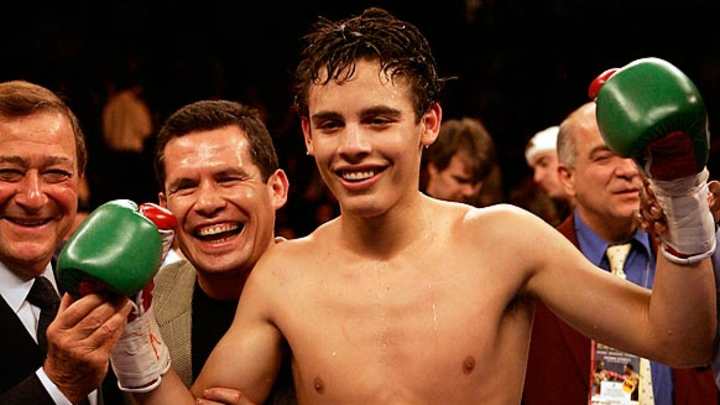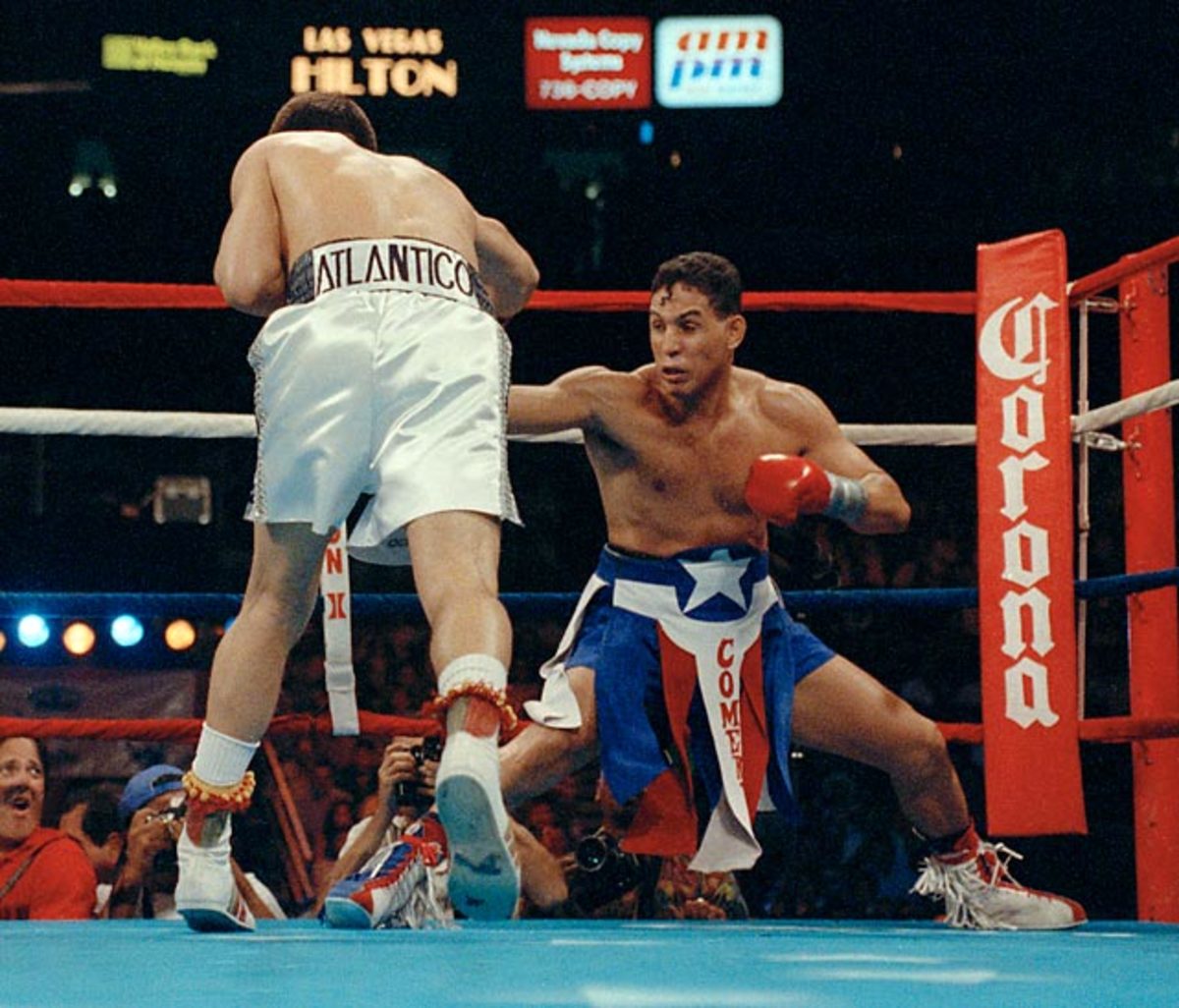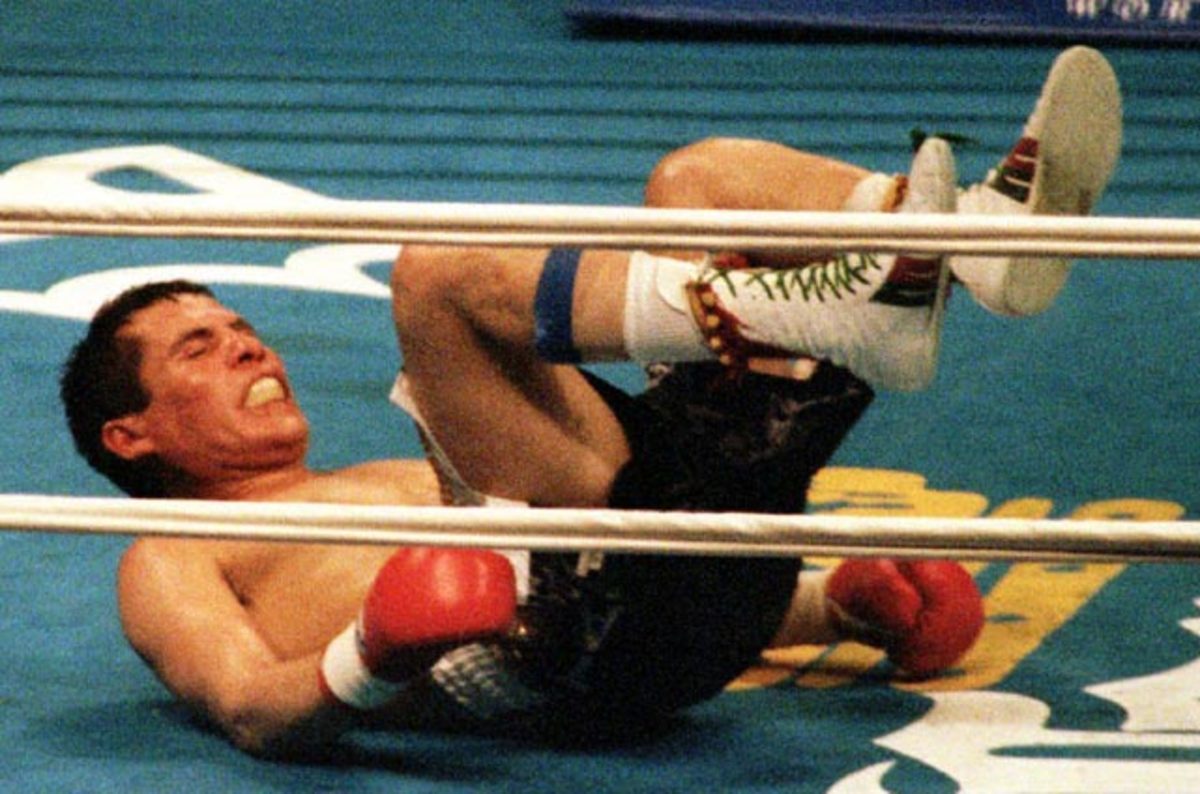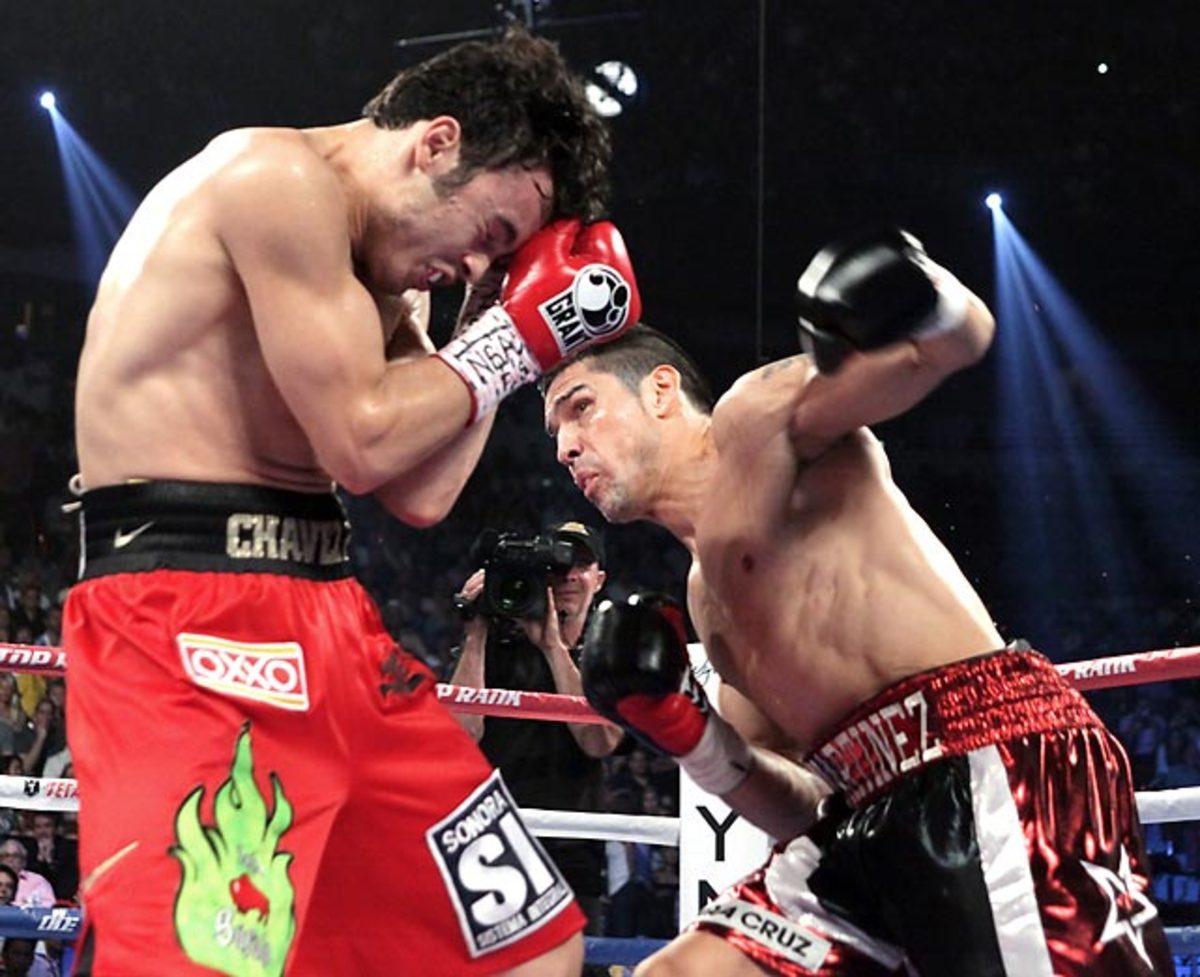Chavez Father and Son: A Rare One-Two

Chavez Father and Son: A Rare One-Two
October 8, 2005

Family has always run deep in the sport of boxing, but the father-son team of Julio César Chávez Sr. and Jr. stands out. The elder Chávez came from a brutally poor background to become a six-time world champion and Mexico's most idolized fighter, the embodiment of his country's ring-warrior ethos. The son, born to privilege thanks to his father's winnings, nonetheless turned pro as a teenager. He fights with a different style, and it remains to be seen if he can approach the greatness of his legendary parent. But, as the following gallery shows, it's been a thrilling ride so far, and father and son are in it together -- just as they were here: With promoter Bob Arum at far left, Julio Sr. revels in Julio Jr.'s 23rd straight victory, a 5th round TKO over Jeremy Stiers at the Thomas & Mack Center in Las Vegas. <bold>MANNIX: Chavez Jr. has potential he must embrace</bold>
March 19, 1985

Julio Cesar Chávez (second from left) was just 22 years old, already 45-0 as a pro, and the newly crowned WBC super featherweight champion when he joined fellow fighters (from left) Hector Camacho, Azumah Nelson and Ruben Castillo, as well as Los Angeles Forum owner Jerry Buss (rear), for a "candid" shot with irrepressible boxing promoter Don King. Chávez would give Castillo a title shot a month later, winning handily on a 6th-round TKO in the Forum.
August 3, 1986

Chávez traveled all the way to Monte Carlo to make the fifth defense of his WBC 130-pound title against the dangerous Rocky Lockridge of Tacoma, Wash. A former WBA champ, Lockridge took some brutal shots but lasted the distance, as Chávez retained his crown on a 12-round majority decision. His march toward greatness continued.
March 17, 1990

In one of the era's most highly-anticipated matches, Chávez brought his WBC lightweight title and 68-0 record into the ring at the Las Vegas Hilton to face 24-0-1 IBF champion and 1984 Olympic gold medalist Meldrick Taylor. In what would be acclaimed the Fight of the Year, both boxers took tremendous punishment but, going into the 12th and final round, Chávez was hopelessly behind on all three judges' cards. Fighting desperately, he dropped Taylor with 17 seconds to go. Taylor beat the count, but referee RIchard Steele, deeming him too badly hurt, shockingly stopped the bout at the 2:58 mark, giving Chávez the win by TKO and preserving his unbeaten streak.
September 12, 1992

It was a classic Mexico-Puerto Rico showdown and an equally classic match up of styles when Chávez defended his WBC super lightweight title against the WBO champ, Hector "Macho" Camacho in Las Vegas. Belying his nickname, the loincloth-sporting challenger was a defensive master who played a hit-and-run game. But despite some high-, or, rather, <italics>low</italics>lights, like this moment in the third round, he couldn't avoid the relentless charges and signature body punching of Chávez, who won a unanimous 12-round decision, further solidifying his status as boxing's reigning pound-for-pound king.
September 10, 1993

Chávez's unblemished record finally took a hit after 87 straight victories when he challenged WBC welterweight champion Pernell "Sweet Pea" Whitaker in the Alamodome in San Antonio and was lucky to come away with a draw. The wizard-like Whitaker, Sports Illustrated's William Nack wrote in his report of the fight, "put on one of the most dazzling ring performances in recent years," yet only one of the judges scored him the winner. The other two called it even, drawing boos from even Chávez's fans. At 31, Chávez was as tough as ever, but his reign as boxing's unquestioned best was over.
January 29, 1994

In just his third outing after his disputed draw with Pernell Whitaker, Chávez, now 89-0-1, defended his WBC 140-pound title against the relatively unheralded Frankie Randall. Chávez came into the bout?which marked the grand opening of the MGM Grand in Las Vegas?as an 18-1 favorite, but Randall took an early lead on the scorecards. Chávez roared back in the middle rounds, but in the 11th Randall caught the champion with a straight right, and Chávez went down for the first time in his career. In the end, having been penalized two points for low blows, he would suffer his first loss as well, on a split decision.
June 7, 1996

In the course of his fabled career, Chávez had become his country's most celebrated and beloved boxer, the very model of the classic Mexican ring warrior. Now, at 33, he would take on a new-look Mexican-American champion, Oscar De La Hoya, a decade his junior. Years before, Chávez had schooled the teenage De La Hoya in a legendary East L.A. sparring session, but on this night at Caesars Palace in Las Vegas, the ascendent Golden Boy tore into the old master, cutting Chávez badly and stopping him in the fourth round. It was a sad moment for Chávez's fans, but, as Richard Hoffer wrote in SI at the time, "There remains a deep reservoir of goodwill for Chávez among his countrymen, and his legacy will not suffer. ... He was too great for too long."
June 28, 1997

Though Larry La Coursiere was never a champion, his mellifluous name holds a place in boxing history?as the <italics>L</italics> next to Julio César Chávez's 100th <italics>W</italics>. Though far from his prime, and fighting on the undercard at the MGM Grand, Chåvez dropped La Coursiere in the fourth and was in control all the way as he ran his career win total to three figures. The achievement was overshadowed, alas, by what happened in the main event?Mike Tyson's infamous chomp on Evander Holyfield's ear.
June 25, 2005

Foregoing a substantial amateur career, Julio César Chávez Jr. turned pro at age 17. And, unlike so many of his era's young prospects, he did it old-school, fighting as often as once a month in Mexico and the U.S. While the competition was hardly distinguished, he built up his name and racked up the wins, including this one, a four-round TKO of Ruben Galvan in Atlantic City on the undercard of the Floyd Mayweather Jr.-Arturo Gatti fight.
December 16, 2005

Even for a warrior who went into battle 115 times in his career, it's harder to watch than it ever was to fight -- especially when it's your son in the ring mixing it up. Chávez Sr., center, reacted to the action during Junior's bout with Carlos Molina. In a hard-fought six-rounder that many thought Molina won, Chávez Jr. escaped with a draw. In a rematch three months later, Chávez would edge Molina for the victory to move to 24-0-1 as a pro.
November 14, 2009

Chávez Jr. continued to win, running his record to 40-0-1, though he had yet to face any serious opposition. At the same time, still growing and maturing physically -- at 6-feet, he was nearly five inches taller than his father -- he was struggling to make the junior middleweight limit of 154 pounds. Here, fighting at 160, Chávez won an easy decision against Troy Rowland on the undercard of the Manny Pacquiao-Miguel Cotto fight in Las Vegas. After the bout, though, it was discovered that Chávez had used a banned diuretic to cut weight, and the result was changed to a no-contest.
November 19, 2011

Chávez Jr. bounced back quickly from the Rowland debacle. Still fighting at 160, he scored an impressive victory over highly-touted John Duddy in June 2010 and then captured his first world title the following year, taking the WBC middleweight crown from Sebastian Zbik of Germany. Chávez made his first defense (left) against Peter Manfredo Jr., who'd made his name on the reality show <italics>The Contender</italics>. Playing the part in real life, Manfredo tried to outwork Chávez but found himself outgunned instead, as the young champion won by fifth-round TKO.
September 15, 2012

His father proved it again and again in his career: The mark of a true champion is the ability to come back from adversity and even defeat. Now Chávez Jr. will have his chance. Outboxed and outworked for the first 11 rounds by Sergio Martinez of Argentina during their bout at the Thomas & Mack Center in Las Vegas (left), Chávez nearly saved his title in the 12th. He knocked Martinez down and had him reeling, but couldn't finish him before the bell. "I could have gone another 12 rounds," Chávez would later say. "Could he?" But the unanimous decision loss cost him his middleweight title?and a post-fight positive test for cannabis cost him a $900,000 fine (later reduced to $100,000) and a nine-month suspension from the Nevada Athletic Commission. Now, he is poised to return to action Saturday night against Bryan Vera. Fittingly, Julio Jr. will have Julio Sr. in his corner.
